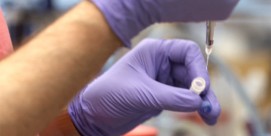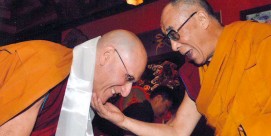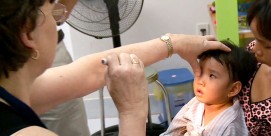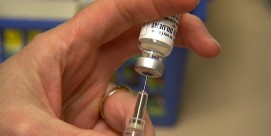In This Episode << SLIDE LEFT TO SEE ADDITIONAL SEGMENTS
MY MOTHER, YOUR MOTHER by Dennis McCollough, M.D
My vision of better care for elders in late life is not a call for a nostalgic return to some imagined romantic past when the lone family doctors sat by the bedside by candlelight tending the ill. It is, rather, a stern and impassioned call to help families struggling to care for their aging and frail elders; to preserve quality of life even in the face of difficult and accumulating diseases; and to mend their neglect by modern health care “systems.” My vision resonates with the old and oft-quoted statement of Harvard physician Dr. Francis Peabody: “The secret of the care of the patient is in caring for the patient.”
 |
In reality, our American medical system is best at managing acute crisis and supplying excellent specialized elective procedures — joint replacements, organ transplants, eye improvements, cosmetic changes — all modern technological wonders. As for the more ordinary and common management and support of elders and families dealing with chronic problems of aging and slow-moving diseases, our medical care system has not done so well. Some elderly patients are fruitlessly subjected to what some critics now call “death by intensive care” — that is, sedated and thus unable to communicate; enduring impersonal medical protocols in strange, disorienting surroundings; or stranded in limbo on life-support machines while families hover in waiting rooms, uncertain how to help. This high drama happens for some, but much more commonly in my experience elders suffer the accumulating burdens of illness and exhausting medical regimens that extract available energies and time, leaving nothing left for living beyond a “medicalized” life. But there is another way, a family-centered, less expensive way shaped by habits of cooperation, coordination, and conservation of limited resources. This is what I call Slow Medicine.
The practice of Slow Medicine has taught me that it is wise to slow down and moderate the urgent pressures of decision-making that are often pushed prematurely on elders by society, the medical profession, worried friends, and family. Well-intentioned, we want to make good and humane choices for ourselves and for those we love. We are troubled by guilty feelings of neglect if we wait too long to act. We often experience nagging doubts of our adequacy in these new and very changed relationships. We live in a society of increasingly tight schedules and pressure-filled, assembly-line efficiencies. We are conditioned to want the maximum application of resources, and we are drawn to the latest technologies rather than humble, slow, old-fashioned, labor-intensive, hands-on work. We are being asked to choose video surveillance of our parents’ homes over regular telephone calls and visits and telemedicine home monitoring of weight and blood pressure over neighborly companionship. I cannot emphasize enough that the years of late life can seldom be managed neatly or even adequately through approaches that led to success in people’s younger years. Insisting on efficiency, promoting multitasking rather than careful listening and being “in the moment,” and ignoring the need for slower transitions during times of change in our parents’ lives serve neither them nor us. We want our parents at all times to feel that they are fully understood. This will not be easy when they are in a stage of life sometimes marked by lost capacities of insight and communication. This special time of heightened interdependency requires solutions that emerge out of established and engaged relationships, hard-achieved consensus, and mature understanding. The achievement of mutual trust is as important as any work of early family building and child rearing and one of the surest hopes for ameliorating the pain and sadness of loss.
In reflecting on the decades of work I’ve done as a clinician, I see that my primary role might best be described as “physician friend.” Ethicist William May’s concept of the “covenantal relationship” is another way of thinking about this doctor-patient alliance. In such partnerships, the doctor expressly becomes the designated “agent” of the patient and family and maintains a covenant, unspoken and unwritten, to be there in time of need. This is an enormous responsibility at any time, although I imagine that it was somewhat easier to fulfill in the past when society was less mobile and medical care was less complex and specialized in its organization and delivery.
I have found that as a working practice, any covenantal relationship usually develops into a two-way commitment. Just as years of regular clinical care have afforded me a many-layered understanding of my patients’ psychological, emotional, and physical circumstances, so, over time, my patients become more attuned to recognizing both their own needs in the moment and my needs as their serving “physician partner.” This kind of two-way personal and professional relationship of mutual trust provides a strong foundation for the kind of care elders need along the road of late life.
The most important consideration underlying all my assumptions about what constitutes good late-life care is the need for kindness. Although some families and caregivers may actually rise to extended enactments of love (or simply loyalty, decency, respect, and gratitude), kindness is the single most reliable ethical and practical guide to doing this work well. Because of the ultimate powerlessness and dependency, indeed, the utter frailty of the old and infirm, kindness is the fundamental position that a caregiver has to sustain. This is not always easy. Days of care giving are long and difficult, and each interaction between caregiver and care received requires patience and forbearance as part of a seemingly endless cycle of chores. Both at home and in institutions, the risk of mistreatment is ever present. A family member or worker with the elderly who can’t assume an attitude of kindness is (or should be) a concern to any organization or family that is engaged in this work. This includes everyone, all the way up through doctors, the staff, and administrators in our hospitals and nursing homes.







